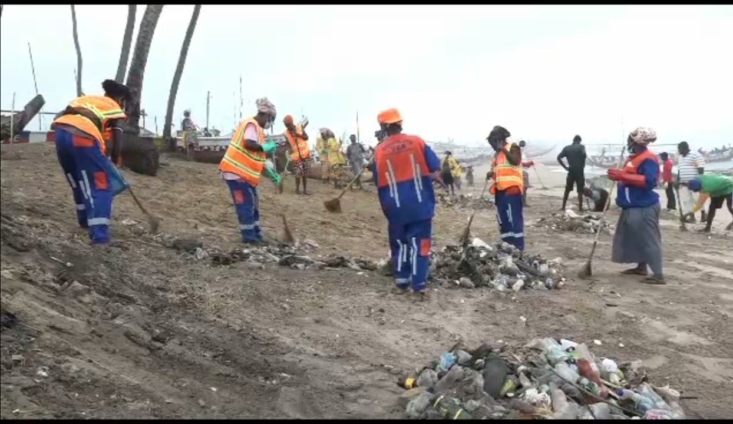A social anthropologist, Dr William Narteh Gblerkpor, says the sharing of knowledge on the environment should not be confined to the classroom.
The C.T. Vivian Teaching Scholar in Sociology and Anthropology, Western Illinois University, United States of America, said environmental literacy should be highlighted in other facets of life beyond the academic domain.
He said space should be created within the Church, home and other places for conversations pertaining to indigenous knowledge on how the environment can be preserved.
Dr Gblerkpor made the comments on Thursday during the School of Arts Biennial Colloquium in Accra.
It was on the theme: “Rethinking West Afriça's Environment: An Arts and Humanities Perspective."
“We must create spaces where people can continuously learn and become partners in understanding our climate, environment so that in case any calamity occurs in the near future, they would already be environmentally competent and be able to survive,” he said.
He said policymakers must develop new language, terminologies, and approaches to attract more attention towards the environment.
Dr Gblerkpor said they should prioritise the use of indigenous knowledge embedded in as arts, music, fashion, amongst others to intensify awareness.
In a speech read on his behalf, Professor Daniel Ofori, Provost of the College of Humanities, University of Ghana, said though science and technology were important, the influence of the arts and humanities in shaping people’s understanding and relationship with the world should not be underestimated.
“The arts have the capacity to evoke emotions, challenge perspectives, and ignite a sense of empathy that scientific data alone cannot achieve. In West Africa, a region rich in cultural diversity, history, and legacies, the arts and humanities offer unique insights into the intricate relationship between humans and the environment,” he said.
He said integrating arts and humanities into discussions, curricula, and research initiatives can foster a deeper understanding of the environment and its value beyond economic measures.
Prof. Ofori said rethinking West Africa's environment from an arts and humanities perspective was not just an academic endeavour but a call to action.
“It's an invitation to embrace the power of literature, the study of religions, cultural heritage, philosophy, and history to inspire the change we wish to see in our region. Let us collaborate, innovate, and reframe the narrative of our relationship with the environment, ensuring a sustainable and thriving future for all,” he said.
Professor Wazi Apoh, Dean, School of Arts, said the School was committed to the publication of innovative research and the presentation of creative works in major national and international venues.
He said the value of Sciences, Technology, Engineering and Mathematics (STEM) education had been overemphasised as possessing the key to development.
However, the revised policy to STEAM to include an “A” for Arts, was tenable because it embraced critical thinking, which was the hallmark of the arts, humanities, and the social sciences.
Prof. Apoh said it was necessary to consider the impacts on both nature and society when seeking sustainable solutions and with issues like these in mind, the 2023 School of Arts Colloquium would jointly rethink the sub-region's environment so that these complex issues can be confronted from an Arts and Humanities perspective.
He said during the last two decades, Environmental Humanities had emerged as a more encompassing approach to reconceptualise and interrogate the environment as an intricate natural-cultural phenomenon.
Nana Poku Bosompim, the Ahafo Regional Manager, Forestry Services Division, Forestry Commission, said a “green revolution” went beyond the ceremonial planting of trees but rather the protection of existing stock of natural forest, a massive afforestation drive to restore degraded forest landscape, nurturing and protecting established plantations.
Nana Bosompim said Ghana’s cultural values encompassed rich traditional conservation values, key amongst them being the culture of stewardship.
He said as stewards, the forebears regarded themselves as custodians of nature and made it their responsibility to hand over a healthy environment to the next generation.
Nana Bosompim bemoaned the non-appreciation of such cultural values, leading to the poor management of natural resources, hence the loss of Ghana’s forest cover at such an alarming rate.
He urged Government to resource and empower Chiefs using applied technology to share their successes to a global network of people so far as traditional conservation values were concerned.
Nana Bosompim called for intensified education or activism to change people’s perception about biodiversity and learn to conserve them.
Latest Stories
-
Philippines’ ex-President Rodrigo Duterte arrested at ICC’s request over ‘drugs war’, government says
16 minutes -
Cowbell-GES Independence Day Debate: Gomoa Senior High Technical outshines Serwaa Kesse Girls’ SHS to win contest
32 minutes -
Geisha champions women’s empowerment and progress at 7th National Women’s Summit & Expo
43 minutes -
Musk’s Tesla facilities in US face ‘Takedown’ protests
55 minutes -
Charity M. E. Adupong’s vision of promoting food security and empowering women in agricbusiness
1 hour -
Stocks fall in US and Asia over Trump tariffs concerns
1 hour -
Liverpool need best display of season to beat PSG – Slot
2 hours -
King and Kate return to annual Commonwealth service
2 hours -
US unveils new app for ‘self-deportations’
2 hours -
More than 80% of USAID programmes ‘officially ending’
2 hours -
Ayra Starr, Mofe-Damijo to join Idris Elba as cast of ‘Children of Blood and Bone’
2 hours -
Businessman, farmer granted bail for allegedly defrauding estate developer
2 hours -
Nigeria’s anti-graft agency recovers nearly $500m in one year
3 hours -
NDC Sowutuom branch organiser granted GH¢100,000 bail pending appeal
3 hours -
Facebook was ‘hand in glove’ with China, BBC told
3 hours

